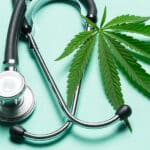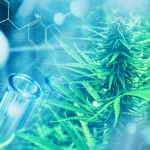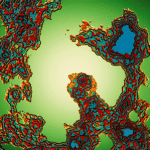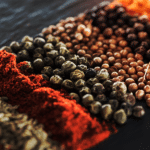Living inside each of us are hundreds of species of bacteria that comprise the gut microbiome, which has a huge impact on our well-being, affecting many physiological processes, including our immunity, metabolism, and neurological function. Medical scientists have shown that an imbalance in the gut microbiome, known as dysbiosis, can lead to depression and other adverse health outcomes. But the specific molecular pathways that link gut dysbiosis to mood disorders is still largely unchartered territory.
A recent report by French scientists in Nature Communications (Chevalier, 2020) breaks new ground in exploring how the endocannabinoid system mediates the impact of gut microbiota on mood and brain function. This paper builds upon previous research into the pathophysiology of depression that focuses on changes in the hippocampus, an area of the brain where cannabinoid (CB1) receptors are concentrated.
CB1 receptors regulate neurogenesis – the creation of new brain cells – in the hippocampus. And the reduction of hippocampal neurogenesis in the adult brain is considered a hallmark of clinical depression.
Several studies indicate that activation of CB1 receptor signaling produces antidepressant effects by stimulating neurogenesis in the hippocampus. Tetrahydrocannabinol (THC) and cannabidiol (CBD) are both neurogenic compounds that promote the formation of neurons in the adult brain. Physical exercise also boosts neurogenesis by priming the endocannabinoid system – whereas chronic stress has the opposite effect.
Chronic stress, a risk factor for many diseases, has been shown to decrease cannabinoid signaling and neurogenesis in the brain. Alterations in gut microbiota composition following chronic stress are also well documented.
Mouse Poop
In an effort to shed light on the mechanisms whereby chronic stress induces dysbiosis, researchers at the Pasteur Institute in Paris transplanted gut microbiota from a stressed-out, depressed mouse to naive, unstressed mice. The naive mice that received the fecal transplant became anxious and exhibited depressive behavior, much like the donor mouse.
Furthermore, the dysbiotic fecal transplant from the chronically stressed mouse resulted in reduced neurogenesis in the hippocampus of the receiving mouse. And the reduction in adult hippocampal neurogenesis was associated with a dysregulation of the endocannabinoid system in the recipient rodent’s brain. These changes were not seen in the laboratory animals that received a “control microbiota” transplant from a normal, unstressed mouse.
Probing further, the French scientists discovered that the dysbiotic fecal transplant altered the fatty acid metabolism of the recipient mice, leading to a “systemic decrease in endocannabinoid precursors.”
Specifically, the researchers identified a paucity of diacylglycerol (DAG) compounds, which are an essential building block of 2-AG [2-Arachidonoyglycerol], the most prevalent endocannabinoid in the brain and body.
“In the hippocampus, we observed a decrease in 2-AG” in mice receiving the dysbiotic fecal transplant “but not with control microbiota,” according to the French team, which noted that serum levels of DAG “were inversely correlated with the severity of depressive-like behaviors.” Depleted DAG means less 2-AG, diminished cannabinoid receptor activity, and more intense mood disorders.
The fecal transplant experiment proved that “intestinal microbiota [are] sufficient to initiate a pathological feed-forward loop for depressive disorders by impairing the endocannabinoid system in the hippocampus, a brain region strongly involved in the development of depressive symptoms.”
Lactobacilli & Endocannabinoid Precursors
Medical researchers have identified key changes in the microbiome that contribute to gut dysbiosis. Fecal transfer data involving mice revealed that stress-induced “perturbations of gut bacterial composition were characterized by loss of Lactobacilli, an alteration that was maintained after microbiota transplantation to naive hosts.” Beyond animal models, gut microbiota dysbiosis characterized by low Lactobacilli frequency has also been detected in depressed humans.
The next step was obvious: ascertain whether probiotic treatment with Lactobacilli would ameliorate depressive-like behavior in mice that received a dysbiotic fecal transplant. Sure enough, that did the trick. A Lactobacillus strain was shown to alleviate microbiota-induced anxiety and depression while boosting endocannabinoid brain levels and hippocampal neurogenesis. “We have found that one of the mechanisms by which Lactobacilli promote these effects is through regulation of the bioavailability of endocannabinoid precursors,” the French study asserted.
This finding adds a new dimension to the significant body of scientific literature, which demonstrates that “Lactobacilli treatment, as well as the administration of other probiotics, are beneficial in significantly lowering depression and anxiety scores in patients.”
It’s reasonable to postulate that in addition to probiotic intervention, a diet rich in endocannabinoid precursor compounds, such as arachidonic acid, will raise 2-AG levels in the brain. Milk and meat are rich sources of arachidonic acid, which combines with DAG to create 2-AG. (Sorry, vegans, but that’s what the science says.) 2-AG activates CB1 cannabinoid receptors in the brain, and this produces anxiolytic and anti-depressant effects by modulating hippocampal neurogenesis in people as well as lab animals.
A Key Pathway
Of course, there are other ways to enhance cannabinoid tone. Consuming resin-rich cannabis is a popular, time-tested option. But this was not the focus of the French study, which identified what seems to be a key pathway linking microbiota dysbiosis to mood disorders.
“In sum,” the authors conclude, “our data show that microbiota dysbiosis induced by chronic stress affects lipid metabolism and the generation of endocannabinoids, leading to decreased signaling in the endocannabinoid system and reduced adult neurogenesis in the hippocampus… Because we were able to interrupt this pathological feed-forward loop by administering arachidonic acid or a Lactobacillus probiotic strain, our study supports the concept that dietary or probiotic interventions might be effective levers in the therapeutic arsenal to fight stress-associated depressive syndromes.”
Martin A. Lee is the director of Project CBD. He’s authored and edited several books, including Smoke Signals, Acid Dreams, and The Essential Guide to CBD. © Copyright, Project CBD. May not be reprinted without permission.
Sources
- Aizawa E, Tsuji H, Asahara T, Takahashi T, Teraishi T, Yoshida S, Ota M, Koga N, Hattori K, Kunugi H. Possible association of Bifidobacterium and Lactobacillus in the gut microbiota of patients with major depressive disorder. J Affect Disord. 2016 Sep 15;202:254-7. doi: 10.1016/j.jad.2016.05.038. Epub 2016 May 24. PMID: 27288567.
- Chevalier, G., Siopi, E., Guenin-Macé, L. et al. Effect of gut microbiota on depressive-like behaviors in mice is mediated by the endocannabinoid system. Nat Commun 11, 6363 (2020). https://doi.org/10.1038/s41467-020-19931-2
- Foster JA, McVey Neufeld KA. Gut-brain axis: how the microbiome influences anxiety and depression. Trends Neurosci. 2013 May;36(5):305-12. doi: 10.1016/j.tins.2013.01.005. Epub 2013 Feb 4. PMID: 23384445.
- Ji ES, Kim YM, Ko YJ, Baek SS. Treadmill exercise in obese maternal rats during pregnancy improves short-term memory through neurogenesis in the hippocampus of rat pups. J Exerc Rehabil. 2020 Oct 27;16(5):392-397. doi: 10.12965/jer.2040618.309. PMID: 33178640; PMCID: PMC7609846.
- Luján MÁ, Valverde O. The Pro-neurogenic Effects of Cannabidiol and Its Potential Therapeutic Implications in Psychiatric Disorders. Front Behav Neurosci. 2020 Jun 26;14:109. doi: 10.3389/fnbeh.2020.00109. PMID: 32676014; PMCID: PMC7333542.
- Moloney RD, Johnson AC, O’Mahony SM, Dinan TG, Greenwood-Van Meerveld B, Cryan JF. Stress and the Microbiota-Gut-Brain Axis in Visceral Pain: Relevance to Irritable Bowel Syndrome. CNS Neurosci Ther. 2016 Feb;22(2):102-17. doi: 10.1111/cns.12490. Epub 2015 Dec 10. PMID: 26662472; PMCID: PMC6492884.
- S Narasimhan KK, Devarajan A, Karan G, Sundaram S, Wang Q, van Groen T, Monte FD, Rajasekaran NS. Reductive stress promotes protein aggregation and impairs neurogenesis. Redox Biol. 2020 Oct;37:101739. doi: 10.1016/j.redox.2020.101739. Epub 2020 Sep 29. PMID: 33242767; PMCID: PMC7695986.
- Suliman NA, Taib CNM, Moklas MAM, Basir R. Delta-9-Tetrahydrocannabinol (∆9-THC) Induce Neurogenesis and Improve Cognitive Performances of Male Sprague Dawley Rats. Neurotox Res. 2018 Feb;33(2):402-411. doi: 10.1007/s12640-017-9806-x. Epub 2017 Sep 21. PMID: 28933048; PMCID: PMC5766723.
- Wolf, S.A., Bick-Sander, A., Fabel, K. et al. Cannabinoid receptor CB1 mediates baseline and activity-induced survival of new neurons in adult hippocampal neurogenesis. Cell Commun Signal 8, 12 (2010). https://doi.org/10.1186/1478-811X-8-12
- Xu W, Yao X, Zhao F, Zhao H, Cheng Z, Yang W, Cui R, Xu S, Li B. Changes in Hippocampal Plasticity in Depression and Therapeutic Approaches Influencing These Changes. Neural Plast. 2020 Nov 26;2020:8861903. doi: 10.1155/2020/8861903. PMID: 33293948; PMCID: PMC7718046
Recommended Readings
Gut Microbiota & the Endocannabinoid System
Scientific research shows that THC and CBD promote a healthy microbiome.
Diet & the Endocannabinoid System
New research on how the ECS impacts hunger, diet, digestion, and energy metabolism.
Essential Fatty Acids & the Endocannabinoid System
How an imbalance of omega-3 and omega-6 undermines our health.












